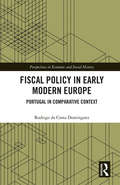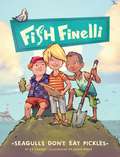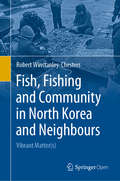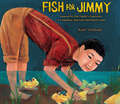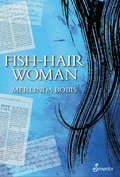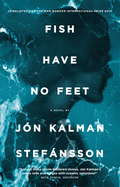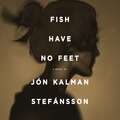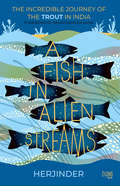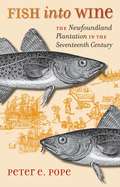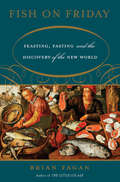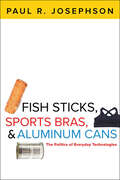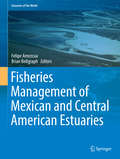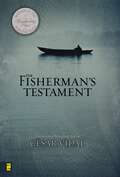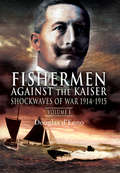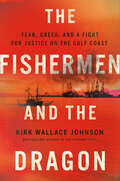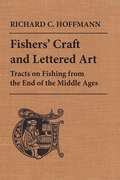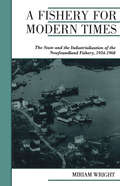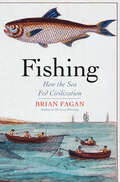- Table View
- List View
Fiscal Monitor
by International Monetary FundIMF staff members examine the reason for the low interest rates paid for sovereign bonds issued by the U. S. and Japan, the sustainability of fiscal improvements in emerging economies, and how long it will take to lower public debt worldwide. Appendices review the theory of fiscal devaluation, analyze past privatization transactions, and track the main determinants of stock-flow adjustments over the last three decades. Color tables and graphs are provided. Annotation ©2012 Book News, Inc. , Portland, OR (booknews. com)
Fiscal Objective in the Post IMF Program World: The Case of Albania
by Jiri JonasA report from the International Monetary Fund.
Fiscal Policy in Early Modern Europe: Portugal in Comparative Context (Perspectives in Economic and Social History)
by Rodrigo da Costa DominguezThis book will examine the gradual assembly and consolidation of Portuguese fiscal policy in the second half of the fifteenth century, providing a comparative analysis of the Portuguese State’s finances and fiscal dynamics with other Western European monarchies. This book examines relevant aspects of the Portuguese Royal finances, particularly the different instruments employed to provide income and the rubrics involving all types of expenditure between the reigns of Afonso V and Manuel I at the dawn of Modern Ages. The analysis of Portugal’s case will also serve as a main conducting wire to a broader fiscal examination of other Latin-rooted Mediterranean and North Atlantic kingdoms. This book will be of interest to students and researchers of economic history, fiscal history, economic theory and history of economic thought, as well as students of Medieval History, the history of the Western Europe and the Iberian Peninsula.
Fiscal Vulnerability and Financial Crises in Emerging Market Economies
by Richard Hemming Axel Schimmelpfennig Michael KellA report from the International Monetary Fund.
Fiscal Vulnerability and Sustainability in Oil-Producing Sub-Saharan African Countries
by Robert York Zaijin ZhanA report from the International Monetary Fund.
Fish Finelli: Seagulls Don't Eat Pickles
by Erica Farber Jason BeeneWhen bully Bryce Billings bets Fish Finelli that he can't find Captain Kidd's legendary long-lost treasure, Fish and his friends embark on a quest to find real-life pirate treasure. Between sneaking into the library to track down Captain Kidd's map, stowing away on a boat, and trespassing on an island, Fish and his friends have their work cut out for them. But will Fish actually be able to find Captain Kidd's booty and win the bet? Appropriate for both boys and girls, this first book inthe Fish Finelli series will inspire readers to use their imaginations, learn about the world around them, and appreciate the bonds of friendship.
Fish, Fishing and Community in North Korea and Neighbours: Vibrant Matter(s)
by Robert Winstanley-ChestersThis open access book explores the histories and geographies of fishing in North Korea and the surrounding nations. With the ideological and environmental history of North Korea in mind, the book examines the complex interactions between local communities, fish themselves, wider ecosystems and the politics of Pyongyang through the lens of critical geography, fisheries statistics and management science as well as North Korean and more generally Korean and East Asian studies. There is increasing global interest in North Korea, its politics, people and landscapes, and as such, this book describes encounters with North Korean fishing communities, as well as unusual moments in the field in the People’s Republic of China, the Russian Federation and the Republic of Korea (South Korea). It addresses fish, fishing infrastructure, fishing science and fishing statistics and other non-human elements of North Korean and other nations’ developmental regimes as actors and participants within them as much as humans and their technologies. The book enables readers to gain extensive insights into the aspirations and practices of fishing in North Korea and its neighbours, the navigation of difficult political and developmental situations and changing ecological realities in a time of environmental and climate crisis familiar to many across the globe.
Fish for Jimmy: Inspired by One Family's Experience in a Japanese American Internment Camp
by Katie YamasakiFor two boys in a Japanese American family, everything changed when Japan bombed Pearl Harbor and the United States went to war. With the family forced to leave their home and go to an internment camp, Jimmy loses his appetite. Older brother Taro takes matters into his own hands and, night after night, sneaks out of the camp and catches fresh fish for Jimmy to help make him strong again. This affecting tale of courage and love is an adaptation of the author's true family story, and includes a letter to readers with more information about the historical background and inspiration.
Fish-Hair Woman
by Merlinda BobisIn 1987, the Philippine government fights a total war against communist insurgency and the village of Iraya is militarized. The days are violent and the nights heavy with fireflies in the river where the dead are dumped. With her 12-meter hair, the "fish-hair woman" Estrella trawls the corpses from the water, which now tastes of lemongrass. She falls in love with the visiting Australian writer Tony McIntyre before he disappears in the conflict. Ten years later, his son Luke is reading this story in a mysterious manuscript sent to Australia with love letters. Tony left Australia when Luke was six, and now at 19 Luke is traveling to the Philippines because his father is supposedly dying. On arrival he is caught in a web of betrayal that spins into the dark, magical tale of the manuscript as fact bleeds into fiction. Luke meets Stella, who could be Tony's lover--or the fish-hair woman--but Tony cannot be found. Poetic and eclectic in style, this epic tale threads a multitude of voices and stories worldwide and ignites a mystery of who is really telling the story.
Fish Have No Feet
by Jón Kalman StefánssonLonglisted for the Man Booker International Prize 2017Keflavik: a town that may be the darkest place in Iceland, surrounded by black lava fields, hemmed in by a sea that may not be fished, and site of the U.S. military base, whose influences shaped Icelandic culture from the '50s to the dawning of the new millennium. Ari - a writer and publisher - lands back in Keflavik from Copenhagen. His father is dying, and he is flooded by memories of his youth in the '70s and '80s, listening to Pink Floyd and the Beatles, raiding American supply lorries and discovering girls. And one girl he could never forget. Layered through Ari's story is that of his grandparents in a village on the eastern coast, a world away from modern Keflavik. For his grandfather Oddur, life at sea was a destiny; for Margrét its elemental power brings only loneliness and fear. Both the story of a singular family and an epic that sparkles with love, pain and lifelong desire - with all of human life - Fish have no Feet is a novel of profound beauty and wisdom by a major international writer.By the author of the acclaimed trilogy, Heaven and Hell, The Sorrow of Angels and The Heart of Man.
Fish Have No Feet
by Jón Kalman StefánssonKeflavik: a town that has been called the darkest place in Iceland, surrounded by black lava fields, hemmed in by a sea that may not be fished. Its livelihood depends entirely on a U.S. military base, a conduit for American influences that shaped Icelandic culture and ethics from the 1950s to the dawning of the new millennium. It is to Keflavik that Ari - a writer and publisher - returns from Copenhagen at the behest of his dying father, two years after walking out on his wife and children. He is beset by memories of his youth, spent or misspent listening to Pink Floyd and the Beatles, fraternising with American servicemen - who are regarded by the locals with a mixture of admiration and contempt - and discovering girls. There is one girl in particular he could never forget - her fate has stayed with him all his life.Lost in grief and nostalgia, he is also caught up in the story of how his grandparents fell in love in Nordfjordur on the eastern coast, a fishing village a world away from modern Keflavik, at time when the old ways still held sway. Their tragic love affair unfolded against the backdrop of Iceland's harsh nature and unforgiving elements.Fish have no Feet is at once the story of a singular family and an epic of Icelandic history and culture. It offers an unique insight into modern Iceland, and the ways in which it has been shaped by outside influences. A sparkling novel of love, pain, loss and lifelong desire that marries the poetic, elemental style of Heaven and Hell, The Sorrow of Angels and The Heart of Man to a modern frame of reference and sensibility.(P)2016 W F Howes Ltd
The Fish Hawk's Nest
by Stephen W. MeaderAndy, while going fishing on a south Jersey island, finds a slaughtered cow and a small chest. Both lead to a smugglers ring and adventure in 1830s south Jersey and Philadelphia. Excellent historical fiction and great characterization
A Fish in Alien Streams: The Incredible Journey of the Trout in India
by Herjinder Singh SahniTHE NEVER-BEFORE-TOLD STORY OF HOW THE TROUT CAME TO CALL INDIAN RIVERS ITS HOME. When the East India Company's business venture with India turned into a full-fledged occupation of the country, the British in India, apart from establishing their governance, were concerned with one more thing - how to make their surroundings here more akin to their homeland. Even as they dotted the Indian terrain with their manicured gardens, clock towers and pristine colonial structures, many among them (particularly a clutch of British anglers) increasingly felt the absence of one essential fish in Indian rivers - the trout. A Fish in Alien Streams presents the astounding story of a motley group of mavericks, adventurers and eccentric naturalists who, driven by their peculiar fixation, were obsessed with introducing the trout to India's rivers.This delightful account of an unknown slice of India's colonial past combines incredible research involving antique books, rare documents and letters of wistful longing for the trout with the minutiae of fishing and skilful planning. Spanning the Kashmir valley, Kullu, Uttarkashi, the Nilgiris, Travancore and Ceylon (now Sri Lanka), this unique and incredible tale is about magnificent passions, countless failures and ultimate triumph.
Fish into Wine
by Peter E. PopeCombining innovative archaeological analysis with historical research, Peter E. Pope examines the way of life that developed in seventeenth-century Newfoundland, where settlement was sustained by seasonal migration to North America's oldest industry, the cod fishery. The unregulated English settlements that grew up around the exchange of fish for wine served the fishery by catering to nascent consumer demand. The English Shore became a hub of transatlantic trade, linking Newfoundland with the Chesapeake, New and old England, southern Europe, and the Atlantic islands. Pope gives special attention to Ferryland, the proprietary colony founded by Sir George Calvert, Lord Baltimore, in 1621, but later taken over by the London merchant Sir David Kirke and his remarkable family. The saga of the Kirkes provides a narrative line connecting social and economic developments on the English Shore with metropolitan merchants, proprietary rivalries, and international competition.Employing a rich variety of evidence to place the fisheries in the context of transatlantic commerce, Pope makes Newfoundland a fresh point of view for understanding the demographic, economic, and cultural history of the expanding North Atlantic world.
Fish on Friday: Feasting, Fasting, and the Discovery of the New World
by Brian M. FaganWhat gave Christopher Columbus the confidence in 1492 to set out across the Atlantic Ocean? Fish on Friday tells the story of the discovery of America as a product of the long sweep of history: the spread of Christianity and the radical cultural changes it brought to Europe, the interaction of economic necessity with a changing climate, and generations of unknown fishermen who explored the North Atlantic in the centuries before Columbus. A fascinating and multifaceted book, Fish on Friday will intrigue everyone who wonders how the vast forces of climate, culture, and technology conspire to create the history we know.
Fish Sticks, Sports Bras, & Aluminum: The Politics of Everyday Technologies
by Paul R. JosephsonA revealing look at the history, politics, and social meanings behind everyday objects.Who would have guessed that the first sports bra was made out of two jockstraps sewn together or that it succeeded because of federal anti-discrimination laws? What do simple decisions about where to build a road or whether to buy into the carbon economy have to do with Hurricane Katrina or the Fukushima nuclear disaster? How did massive flood control projects on the Mississippi River and New Deal dams on the Columbia River lead to the ubiquity of high fructose corn syrup? And what explains the creation—and continued popularity—of the humble fish stick?In Fish Sticks, Sports Bras, and Aluminum Cans, historian Paul R. Josephson explores the surprising origins, political contexts, and social meanings of ordinary objects. Drawing on archival materials, technical journals, interviews, and field research, this engaging collection of essays reveals the forces that shape (and are shaped by) everyday objects.Ultimately, Josephson suggests that the most familiar and comfortable objects—sugar and aluminum, for example, which are inextricably tied together by their linked history of slavery and colonialism—may have the more astounding and troubling origins. Students of consumer studies and the history of technology, as well as scholars and general readers, will be captivated by Josephson’s insights into the complex relationship between society and technology.“Josephson’s conclusions are guaranteed to make you think of the modern world and its interconnectedness in a different light.” —Cosmos“Every chapter of this book offers surprising insights and is a pleasure to read.” —ICON
Fish Sticks, Sports Bras, and Aluminum Cans: The Politics of Everyday Technologies
by Paul R. JosephsonWhat do bananas, rocket ships, bicycles, and French fries have in common?Who would have guessed that the first sports bra was made out of two jockstraps sewn together or that it succeeded because of federal anti-discrimination laws? What do simple decisions about where to build a road or whether to buy into the carbon economy have to do with Hurricane Katrina or the Fukushima nuclear disaster? How did massive flood control projects on the Mississippi River and New Deal dams on the Columbia River lead to the ubiquity of high fructose corn syrup? And what explains the creation—and continued popularity—of the humble fish stick? In Fish Sticks, Sports Bras, and Aluminum Cans, historian Paul R. Josephson explores the surprising origins, political contexts, and social meanings of ordinary objects. Drawing on archival materials, technical journals, interviews, and field research, this engaging collection of essays reveals the forces that shape (and are shaped by) everyday objects. Ultimately, Josephson suggests that the most familiar and comfortable objects—sugar and aluminum, for example, which are inextricably tied together by their linked history of slavery and colonialism—may have the more astounding and troubling origins. Students of consumer studies and the history of technology, as well as scholars and general readers, will be captivated by Josephson’s insights into the complex relationship between society and technology.
Fisheries Management of Mexican and Central American Estuaries
by Felipe Amezcua Brian BellgraphThe tropical estuarine systems of Mexico and Central America are an important part of the region´s coastlines; for example Mexico alone possesses more than 770 thousand hectares of mangroves, as well as the largest estuarine mangrove complex on the American Pacific (Marismas Nacionales), yet is one of the poorest studied areas in the world. This is the first book that deals extensively with fisheries management issues in this region from physical-chemistry, ecological and socioeconomic views, providing an understanding on the function and the effects of human activities on these areas, with works undertaken by local scientist.
The Fisherman's Testament
by Cãesar VidalIn AD 62, Marco Junio Vitalis, a seasoned military general, is assigned to interrogate an elderly Jewish fisherman called Peter and unravels a story that shakes the very foundations of the Roman Empire. Now making its debut in English, this award-winning Spanish bestseller transports readers to ancient Rome where the stakes are high for Christ followers.
Fishermen Against the Kaiser: Shockwaves of War, 1914–1915
by Douglas d'EnnoBritish fishermen are among the unsung heroes of the First World War. The conflict with Germany had an immediate and enduring impact on their lives and livelihood. They were immediately caught up in the sea war against the Kaisers navy, confronting the threats presented by the submarines, minelayers, gunboats and capital ship of the High Seas Fleet. Often they found themselves thrust into strange, dangerous situations, which put their lives at risk and tested to the limit their bravery and skill as seamen. This is their fascinating story.For the first time in this two-volume study Douglas dEnno provides a comprehensive and lasting record of the services rendered by the fishermen and their vessels, both under naval control and on their own account. His pioneering history shows the full extent of their contribution to the British war effort, from minesweeping and submarine detection to patrol, escort and counterattack duties. The areas of action were not limited to the home waters of the Channel, the North Sea and the Western Approaches but ranged as far as the Arctic and the Mediterraneans Aegean and Adriatic seas. Extraordinary stories are recounted here of the hazards of minesweeping, battles with U-boats, decoy missions, patrols, blockades, rescues and capture by the enemy. First-hand accounts make up the essence of the material. Reports from the leading trade journals, specialist literature and personal manuscripts vividly recall the fishermens experiences and the hardships and dangers they faced throughout the war.
The Fishermen and the Dragon: Fear, Greed, and a Fight for Justice on the Gulf Coast
by Kirk Wallace JohnsonA gripping, twisting account of a small town set on fire by hatred, xenophobia, and ecological disaster—a story that weaves together corporate malfeasance, a battle over shrinking natural resources, a turning point in the modern white supremacist movement, and one woman&’s relentless battle for environmental justice.By the late 1970s, the fishermen of the Texas Gulf Coast were struggling. The bays that had sustained generations of shrimpers and crabbers before them were being poisoned by nearby petrochemical plants, oil spills, pesticides, and concrete. But as their nets came up light, the white shrimpers could only see one culprit: the small but growing number of newly resettled Vietnamese refugees who had recently started fishing. Turf was claimed. Guns were flashed. Threats were made. After a white crabber was killed by a young Vietnamese refugee in self-defense, the situation became a tinderbox primed to explode, and the Grand Dragon of the Texas Knights of the Ku Klux Klan saw an opportunity to stoke the fishermen&’s rage and prejudices. At a massive Klan rally near Galveston Bay one night in 1981, he strode over to an old boat graffitied with the words U.S.S. VIET CONG, torch in hand, and issued a ninety-day deadline for the refugees to leave or else &“it&’s going to be a helluva lot more violent than Vietnam!&” The white fishermen roared as the boat burned, convinced that if they could drive these newcomers from the coast, everything would return to normal. A shocking campaign of violence ensued, marked by burning crosses, conspiracy theories, death threats, torched boats, and heavily armed Klansmen patrolling Galveston Bay. The Vietnamese were on the brink of fleeing, until a charismatic leader in their community, a highly decorated colonel, convinced them to stand their ground by entrusting their fate with the Constitution. Drawing upon a trove of never-before-published material, including FBI and ATF records, unprecedented access to case files, and scores of firsthand interviews with Klansmen, shrimpers, law enforcement, environmental activists, lawyers, perpetrators and victims, Johnson uncovers secrets and secures confessions to crimes that went unsolved for more than forty years. This explosive investigation of a forgotten story, years in the making, ultimately leads Johnson to the doorstep of the one woman who could see clearly enough to recognize the true threat to the bays—and who now represents the fishermen&’s last hope.
Fishers' Craft and Lettered Art: Tracts on Fishing from the End of the Middle Ages (The Royal Society of Canada Special Publications #12)
by Richard C. HoffmannFishers' Craft and Lettered Art provides editions, English translations, and analysis from social, cultural, and environmental perspectives of the three oldest European extended tracts on fishing. Richard Hoffmann discusses the history of fishing in popular culture and outlines the economic and ecologic considerations needed to examine and understand the fishing manuals. Hoffmann further explores how continental fishing traditions were conveyed from oral craft practice into printed culture, and proposes that these manuals demonstrate a lively and complex interaction between written texts and popular culture. The tracts are presented in their original languages - Spanish and German - with facing page translations. Close attention is paid to original setting, functions, and possible range of readings, with detailed explanatory notes to help modern fishers and historians.Fishers' Craft and Lettered Art is a fascinating look at one vital aspect of everyday life at the end of the Middle Ages.
A Fishery for Modern Times
by Miriam WrightIn the early 1990s, the northern cod populations off the coast of Newfoundland had become so depleted that the federal government placed a moratorium on commercial fishing. The impact was devastating, both for Newfoundland's economy and for local fishing communities. Today, although this natural resource - exploited commercially for over 500 years - appears to be returning in diminished numbers, many fisheries scientists and fishers question whether the cod will ever return to its former abundance.In A Fishery for Modern Times, Miriam Wright argues that the recent troubles in the fishery can be more fully understood by examining the rise of the industrial fishery in the mid-twentieth century. The introduction of new harvesting technologies and the emergence of 'quick freezing', in the late 1930s, eventually supplanted household production by Newfoundland's fishing families. While the new technologies increased the amount of fish caught in the northwest Atlantic, Wright argues that the state played a critical role in fostering and financing the industrial frozen fish sector. Many bureaucrats and politicians, including Newfoundland's premier, Joseph Smallwood, believed that making the Newfoundland fishery 'modern', with centralization, technology, and expertise, would transform rural society, solving deep-seated economic and social problems.A Fishery for Modern Times examines the ways in which the state, ideologies of development, and political, economic, and social factors, along with political actors and fishing company owners, contributed to the expansion of the industrial fishery from the 1930s through the 1960s. While the promised prosperity never fully materialized, the continuing reliance on approaches favouring high-tech, big capital solutions put increasing pressure on cod populations in the years that followed. As Wright concludes, 'We can no longer afford to view the fisheries resources as "property" of the state and industry, to do with it as they choose. That path had led only to devastation of the resource, economic instability, and great social upheaval.'
Fishing: How the Sea Fed Civilization
by Brian FaganAn archaeologist examines humanity&’s last major source of food from the wild, and how it enabled and shaped the growth of civilization.In this history of fishing—not as sport but as sustenance—archaeologist and best-selling author Brian Fagan argues that fishing was an indispensable and often overlooked element in the growth of civilization. It sustainably provided enough food to allow cities, nations, and empires to grow, but it did so with a different emphasis. Where agriculture encouraged stability, fishing demanded movement. It frequently required a search for new and better fishing grounds; its technologies, centered on boats, facilitated movement and discovery; and fish themselves, when dried and salted, were the ideal food—lightweight, nutritious, and long-lasting—for traders, travelers, and conquering armies. This history of the long interaction of humans and seafood tours archaeological sites worldwide to show readers how fishing fed human settlement, rising social complexity, the development of cities, and ultimately the modern world.&“A tour-de-force . . . Achieves its goal of putting fishing on par with hunter-gathering and agriculture in the history of human civilization.&” —Leon Vlieger, Natural History Book Service &“A valuable book as well as an interesting one . . . Fagan succeeds in providing an admirable primer for the enthusiast and a welcome tool for the historian.&” —Economist&“A unique panoramic survey of the field.&” —Laurence A. Marschall, Natural History&“Gently scholarly, elegant . . . A compelling picture of how fishing was so integral in each society&’s development. A multilayered, nuanced tour of &“fishing societies throughout the world&” and across millennia.&” —Kirkus Reviews

